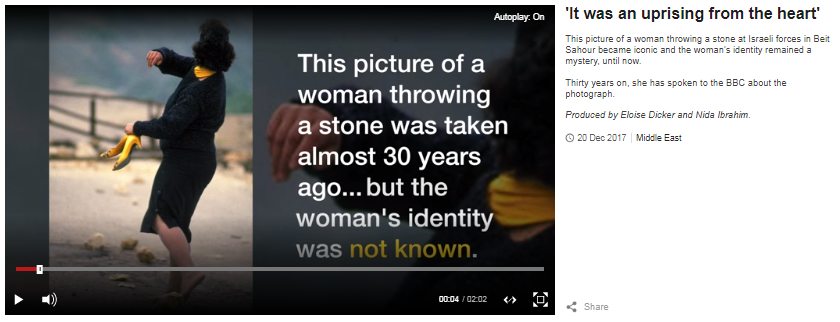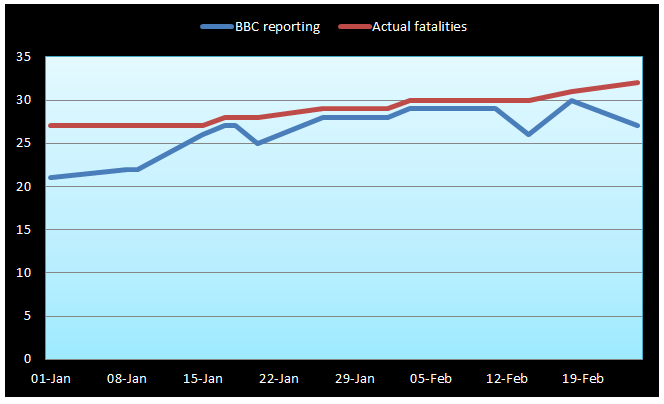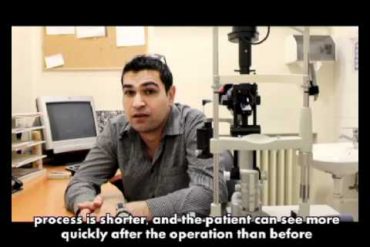December 9th marked thirty years since the beginning of the first Intifada and on December 20th the BBC News website published a filmed report on that topic made by Eloise Dicker and Nida Ibrahim and headlined “‘It was an uprising from the heart’“.
“This picture of a woman throwing a stone at Israeli forces in Beit Sahour became iconic and the woman’s identity remained a mystery, until now.
Thirty years on, she has spoken to the BBC about the photograph.”

Whether or not that photograph can really be described as “iconic” – i.e. widely recognised – is of course debatable. BBC audiences are told that:
“This picture of a woman throwing a stone was taken almost 30 years ago but the woman’s identity was not known. The stone was aimed at Israeli forces in Beit Sahour, a village in the occupied West Bank.”
The woman – Micheline Awwad – then identifies herself in the photograph.
Awwad: “This is Micheline. It’s me. Of course it’s me.”
Viewers are then told that:
“In 1987, Palestinians began an “intifada”, or uprising, against Israeli rule. It lasted until 1993. Violent clashes led to the deaths of around 1,400 Palestinians and 271 Israelis.”
Although those statistics are credited to B’tselem, a look at the political NGO’s website shows that the total figures it gives for Palestinian casualties between December 9th 1987 and December 31st 1993 are lower by 196 than the number presented by the BBC. The subject of the nearly one thousand Palestinians killed by other Palestinians in those years did not make it into this BBC film.
The film goes on to give more statistics credited to B’tselem, with the number of Israelis killed during the second Intifada lower than those provided by official sources.
“There was a second intifada in 2000. Around 3,392 Palestinians and 996 Israelis were killed.”
The film then returns to Awwad.
Awwad: “I was wearing a black skirt and top, a yellow scarf and yellow heels. There was a special Mass at the church. Otherwise I wouldn’t have worn that outfit for a protest. When I saw the Israeli army approaching young men and confronting them, I followed the young men. When I started running – I couldn’t run with those shoes – I took them off and carried them. I didn’t know someone was taking a picture. It was an uprising from the heart. Young men and women passionately took to the streets. But not anymore. Young men and women today don’t want this.”
The BBC then inserts the following:
“There were calls for another intifada after the US recognised Jerusalem as Israel’s capital. Palestinians want the east of the city to be a capital of a future Palestinian state.”
Notably, viewers were not told that there were also “calls for another intifada” on numerous other prior occasions too. The film closes:
Awwad: “I have two sons. If, God forbid, one of them gets injured and dies, I’ll be heartbroken for life. Let my son stay at home – I’ll go out. Of course I would go out.”
“Micheline Awwad now works in a hotel. She doesn’t have the yellow heels any longer.”
In addition to the wording in this film, its visuals are also worthy of note. Throughout much of the film viewers see close-up shots of Awwad. However, they also see seven different images of photographs taken during the first Intifada – four of which show women in passive poses. None of the images including men – one of which features a priest – depict Palestinian acts of violence. Israeli soldiers with truncheons and guns are however shown in three of the images.
In the past the BBC has promoted the myth that the first Intifada was ‘non-violent’ (see ‘related articles’ below) and has completely erased Israeli casualties from its accounts. While it is therefore good to see those casualties finally acknowledged, this film nevertheless perpetuates the BBC’s long-standing romanticisation of type of Palestinian violence all too often euphemistically portrayed (if at all) as ‘protest’.
Related Articles:
BBC promotion of the myth of a non-violent first Intifada
Romanticising rocks and stones: BBC on the first Intifada




